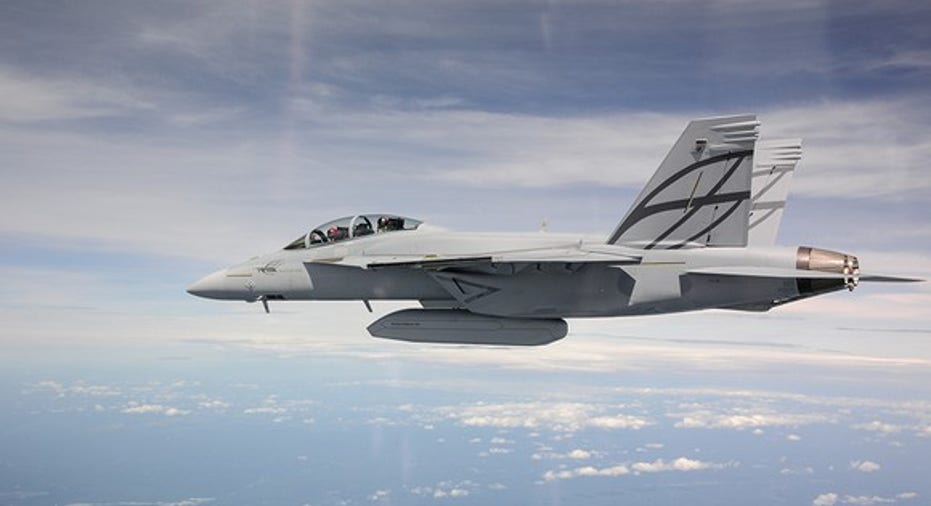Boeing Plots Full-Scale Assault on Lockheed Martin's F-35

President Donald Trump loves Lockheed Martin's (NYSE: LMT) "fantastic new F-35 jet fighter" -- at least now that Lockheed Martin has cut its price on the F-35, he does. That said, last we heard, the president still wanted Boeing (NYSE: BA) to price out a "comparable F-18 Super Hornet" so that he can comparison-shop.
And Boeing is only too happy to do that.
Boeing is pitching an Advanced Super Hornet as an alternative to Lockheed's F-35. Image source: Boeing.
Paper chase
In recent weeks, word has been filtering out of a new "white paper"being circulated around Washington, D.C., which touts Boeing's F/A-18 Super Hornet as a better value proposition than Lockheed's F-35 -- and makes the case for the U.S. Navy to buy more of the former and less of the latter.
As reported on DefenseOne.com last month, the white paper in question states the case thusly: "TheU.S.Navy currently plans to have a Carrier Air Wing mix of 3 squadrons of F/A-18 Super Hornets and 1 squadron of F-35Cs in 2028 transitioning to 2 squadrons of F/A-18 Super Hornets and 2 squadrons of F-35C in 2033." (Plus supporting sub-hunting, electronic-warfare, and airborne early warning aircraft.)
Boeing, however, argues that buying all the F-35s required to obtain the air-wing mix as described "will be prohibitively expensive" and "leaves the Navy with a significant inventoryshortfall" in the near term, because of production delays with the F-35C.
So what is Boeing's solution?
Glad you asked...
Buy more F/A-18s, of course. Specifically, Boeing in this white paper argues that the Navy should buy some 120 current-model F/A-18E/F fighters and substitute 200 units of a new and improved, stealthier variant of its Super Hornet -- which it calls alternately the F/A-18XT, Block 3 Super Hornet, or Advanced Super Hornet -- for F-35Cs that the Navy would otherwise buy. (The Navy's total planned purchases of F-35Cs number 350 units,so Lockheed would still sell some F-35Cs -- just not nearly as many as it had hoped.)
Now what would all this mean to investors? Lockheed Martin's F-35C currently costs about $122 million. That's about $43 million more than the $79 million Boeing says it would charge for an Advanced Super Hornet.Thus, by switching out 200 purchases of F-35s for 200 purchases of Advanced Super Hornets, Boeing says the Navy could save about $8.6 billion. What's more, Boeing also says its Advanced Super Hornet would be easier to maintain. Factoring savings from operations and maintenance costs into the equation adds up to "about $30 billion" saved over 20 years.
That's enough to buy the Navy two brand-new Ford-class supercarriers with the savings -- which is a proposition attractive enough that it might persuade the Navy to give Boeing's proposal a listen.
What it means to investors
Now what does all this mean to investors? If Boeing succeeds in persuading the Navy to follow its strategy and buy 120 current model F/A-18s at about $70 million each, plus 200 Advanced Super Hornets instead of 200 F-35Cs, the revenue opportunity for Boeing would be immense -- about $24.2 billion. At the 9.8% operating profit margin that Boeing currently earns on its military aircraft (according to data from S&P Global Market Intelligence), that would work out to an additional $2.4 billion in profit for Boeing. (Granted, Boeing's white paper doesn't say how long it would take to build these planes and book these profits, but with 62% of the Navy's F/A-18 fleet currently out of service, requiring parts or major repairs, one imagines that the time frame for buying new planes -- whatever the type -- is fairly urgent.)
On the flip side, losing 200 F-35C sales would be disastrous for Lockheed Martin. For one thing, at Lockheed's operating profit margin of 10.5%, the $24.4 billion in revenue expected from 200 F-35C sales implies $2.6 billion in operating profit -- all of which would be lost if Boeing's white paper wins traction in the Pentagon. For another, shrinking the overall number of F-35s built would mean Lockheed cannot spread research and development costs out among as many aircraft -- increasing the cost per plane, and making the F-35 less attractive to future buyers, creating a snowball effect of higher prices leading to fewer sales, and vice-versa.
That's what's at stake here, as Boeing makes its full-court press against Lockheed's fighter-jet business. While there's no guarantee Boeing will succeed with this gambit, now you know why it's still trying.
10 stocks we like better than Boeing When investing geniuses David and Tom Gardner have a stock tip, it can pay to listen. After all, the newsletter they have run for over a decade, Motley Fool Stock Advisor, has tripled the market.*
David and Tom just revealed what they believe are the 10 best stocks for investors to buy right now... and Boeing wasn't one of them! That's right -- they think these 10 stocks are even better buys.
Click here to learn about these picks!
*Stock Advisor returns as of April 3, 2017
Rich Smith has no position in any stocks mentioned. The Motley Fool has no position in any of the stocks mentioned. The Motley Fool has a disclosure policy.



















